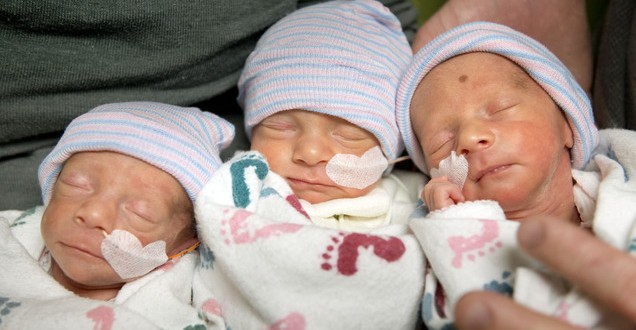A Sacramento couple hit the genetic lottery when they welcomed identical triplets, conceived without fertility drugs, last month.
Doctors say the odds of naturally conceiving identical triplets, where a single fertilized egg is divided into three separate embryos, may be as high as “one in a million.”
The parents of the triplets told reporters they were happy about their three bundles of joy.
“Identical triplets are anywhere from one-in-a-million and one-in-a hundred million,” said Dr. William M. Gilbert, medical director of Sutter Women’s Services and founder of Moms of Multiples Center. “It is so rare that it is hard to calculate how frequently they occur.”
“We are thinking of bottling the water in Quincy and offering it as a fertility treatment,” said Tom Hepner, 33.
At birth, Abby weighed 3 pounds, 2 ounces; Brin was 3 pounds, 11 ounces; and Laurel tipped the scale at 4 pounds. Gilbert said those are good weights for triplets and the babies are doing well.
“It is not unusual with identical triplets to have a difference in weight,” said Gilbert. “They usually don’t share equal amounts of the placenta, so therefore one gets a little less nutrition than the other. When you have a difference in weight, the little one does better after they are born because the stress of being little matures your lungs faster.”
Once all three can maintain their body temperature, gain weight and eat properly, the triplets can go home. Gilbert said their mother experienced some increasing blood pressure several weeks before delivery.
Tom Hepner said his 29-year-old wife is “quite a remarkable woman. She cruised through the experience. Hats off to her.”
The couple found out early on that the triplets were identical.
“We understand that they are going to be individuals,” Hannah Hepner said. “We look forward to finding out who those individuals are and helping them along the way.”
She said the “one-in-a-million” description of the babies “loses its relevance when you are holding them. It did happen and they are here.”
 Canada Journal – News of the World Articles and videos to bring you the biggest Canadian news stories from across the country every day
Canada Journal – News of the World Articles and videos to bring you the biggest Canadian news stories from across the country every day



